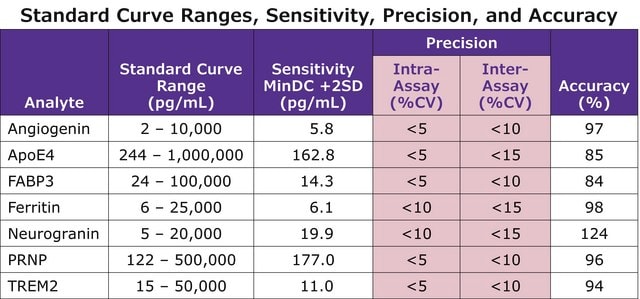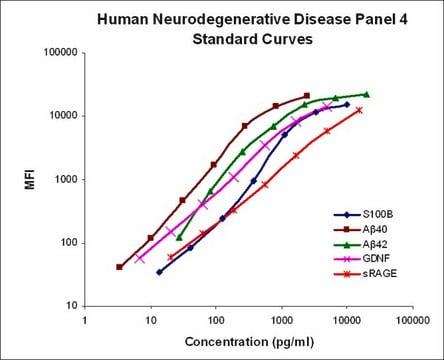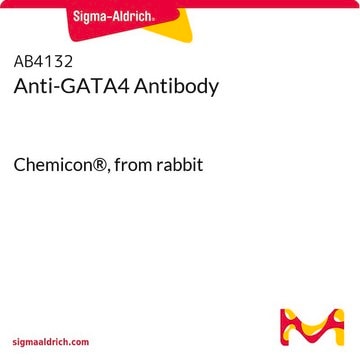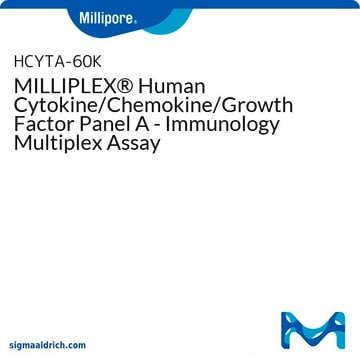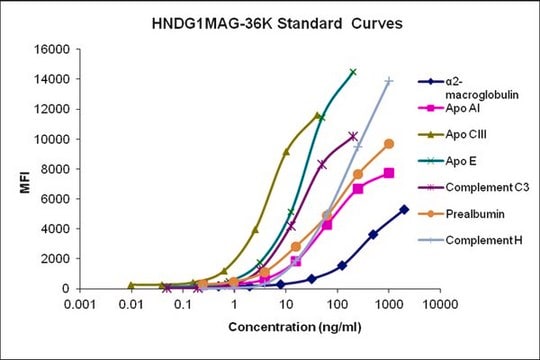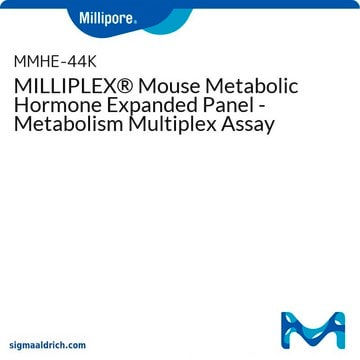The kit has been verified for use with CSF and cell/tissue culture supernatants. Protein normalization is not required for these sample types. If using the kit with cell or tissue lysates, the sample will need to be normalized to total protein, using either a BCA or Coomassie-based assay. The product has not been validated for use with cell/tissue lysates.
HNS1MAG-95K
MILLIPLEX® Human Neuroscience Magnetic Bead Panel 1 - Neuroscience Multiplex Assay
allows quantitative multiplex detection of multiple analytes simultaneously
About This Item
Productos recomendados
Nivel de calidad
reactividad de especies
human
fabricante / nombre comercial
Milliplex®
assay range
accuracy: 107%
(DJ1)
accuracy: 108%
(a-Synuclein)
accuracy: 123%
(TG2)
standard curve range: 12-50,000 pg/mL
(GFAP)
standard curve range: 15-60,000 pg/mL
(NSE)
standard curve range: 20-80,000 pg/mL
(UCHL1)
standard curve range: 244-1,000,000 pg/mL
(alpha-synuclein)
standard curve range: 61-250,000 pg/mL
(DJ1)
standard curve range: 61-250,000 pg/mL
(TG2)
técnicas
multiplexing: suitable
método de detección
fluorometric (Luminex xMAP)
Condiciones de envío
ambient
Descripción general
MILLIPLEX® Human Neuroscience Bead Panel 1 is a 6-plex kit to be used for the simultaneous quantification of any or all of the following analytes in cerebrospinal fluid (CSF) samples: α-Synuclein, DJ1/PARK7, Glial fibrillary acidic protein (GFAP), Neuron specific enolase (NSE), Transglutaminase 2 (TGM2), and Ubiquitin carboxyl-terminal esterase L1 (UCHL1/PARK5).
Panel Type: Neuroscience
Especificidad
Cross-reactivity between the antibodies and any of the other analytes in this panel is non-detectable or negligible.
Aplicación
- Analytes: GFAP, NSE, α-Synuclein, PARK5, Transglutaminase 2 (TGM2)
- Recommended Sample type: CSF
- Recommended Sample dilution: Neat
- Assay Run Time: Overnight or one day
- Research Category: Neuroscience
Características y beneficios
Envase
Almacenamiento y estabilidad
Otras notas
Información legal
Cláusula de descargo de responsabilidad
Certificados de análisis (COA)
Busque Certificados de análisis (COA) introduciendo el número de lote del producto. Los números de lote se encuentran en la etiqueta del producto después de las palabras «Lot» o «Batch»
¿Ya tiene este producto?
Encuentre la documentación para los productos que ha comprado recientemente en la Biblioteca de documentos.
Contenido relacionado
Learn how to integrate multiplex and high sensitivity immunoassay technology to further neuroscience research with MILLIPLEX® multiplex and Single Molecule Counting (SMC®) high sensitivity immunoassay detection of Alzheimer’s disease (AD) biomarkers in human cerebrospinal fluid, plasma, and serum samples.
Learn how multiplex detection of Alzheimer’s disease biomarkers, using the MILLIPLEX® Human Amyloid Beta and Tau Magnetic Bead Panel, allows for a different perspective on neurodegenerative disease research.
Neuroscience multiplex assays, such as MILLIPLEX® multiplex assays, enable simultaneous measurement of neuroscience-related biomarkers to gain a better picture of neurodegenerative diseases, neurological disorders, and neuropeptide/neurohormone signaling.
Find immunoassays to explore neuroimmunology and neuroinflammation cytokines and neurodegenerative disease biomarkers.
-
How can I normalize protein for this test? Just using same volume and total concentration protein are not reliable.
1 respuesta-
¿Le ha resultado útil?
-
-
Can serum or plasma samples be utilized in the Human Neuroscience Panel 1 kit, considering that the protocol exclusively mentions CSF?
1 respuesta-
The kit has not been validated with serum/plasma samples. Eight normal plasma samples were tested at a 1:4 dilution. It was found that GFAP and UCHL1 will require more sensitivity.
¿Le ha resultado útil?
-
Filtros activos
Nuestro equipo de científicos tiene experiencia en todas las áreas de investigación: Ciencias de la vida, Ciencia de los materiales, Síntesis química, Cromatografía, Analítica y muchas otras.
Póngase en contacto con el Servicio técnico
